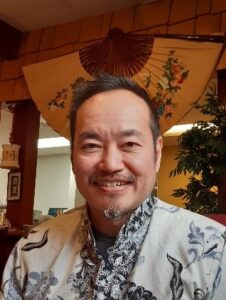by Andi Santoso, originally published by Mennonite Church USA Communications
This blog is in celebration of Asian American and Pacific Islander Heritage Month.

Andi Santoso is from Surabaya, East Java, Indonesia. He is an ordained minister of Gereja Kristen Muria Indonesia (GKMI), also known as the Muria Christian Church of Indonesia. He came to the U.S. in August 2019, after completing a term as general secretary of the GKMI Synod. He earned a Master of Arts in theology and peace studies from Anabaptist Mennonite Biblical Seminary, April 2022. Currently, Andi is serving as Mennonite Mission Network’s regional director for Asia and the Middle East. He also serves on the Deacons Commissions of Mennonite World Conference (MWC). Andi is married to Chialis, and they have two children. Andi loves teaching, coaching, networking, connecting people and, of course, drinking coffee. He is deeply committed to the gospel of peace and God’s reconciling mission, as well as reconciliation as mission. He is also interested in trauma healing and holistic healing, through shalom-making — holistic peace, harmony and simplicity. #ThinkPeace
______________________________
“And I tell you this, that many Gentiles will come from all over the world—from east and west—and sit down with Abraham, Isaac, and Jacob at the feast in the Kingdom of Heaven.” — Matthew 8:11 (NLT)
In June 2017, I was on the transit from Augsburg, Germany, going back to Indonesia. After several hours of waiting for my next departure in Schiphol Airport, I was told that my flight was canceled, and I would have to spend one night in Amsterdam, Netherlands. That night, I met two Muslim scholars from Indonesia who were studying at Vrije University, working toward their master’s degrees in trauma healing and peace studies. We became friends and stayed in touch. Both have since become professors at Islamic universities.
Saiful, one of these friends, visited me in Semarang, Indonesia, several years ago. He brought 30 students to learn about Christianity, and we ended up visiting one of the Gereja Kristen Muria Indonesia (GKMI) churches near my office, GKMI Synod. This is such a great friendship and example of interreligious dialogue, based on our common suffering in Amsterdam. This became the common ground that brought our friendship and future partnership together.
This is the spirit of “Gotong Royong,” a sense of solidarity across barriers, especially in times of crisis.
Earlier this year, I joined the Mennonite Church USA Constituency Leaders Council meeting in San Antonio, Texas, as an Asian Mennonite Ministries representative. During this time, I heard a presentation about the challenges of the church in North America, where religiosity seems to be declining but spirituality is not. As a newcomer and a sojourner in this land, I asked myself, “What kinds of things I can contribute, as a Chinese-Indonesian person, who has been living in the U.S. for four years?”
In my work with Mission Network this past year, I have been listening to many stories about our workers across Asia/the Middle East, as well as our partners from many other countries. I began to ask myself, “What can I contribute to many conversations that I might not be able to understand fully?” Does anyone want to hear a voice from the Global South?
How can we face these challenges and uncertainties as a global communion of believers in North America and in other parts of the world? As global citizens, we have common suffering, a sense of unity amid any challenges, regardless of our ethnicities, nationality or demographics. We can find hope by seeing the future through the lens of the coming of God’s kingdom on earth.
According to Jürgen Moltmann in “The Coming God: Christian Eschatology,” we can see the eschatological vision through the lens of the kingdom of God. Furthermore, he says, “In God’s creative future, the end will become the beginning, and the true creation is still to come and is ahead of us.” He offers four horizons for Christian eschatology:
- It is hope in God for God’s glory.
- It is hope in God for the new creation of the world.
- It is hope in God for the history of human beings with the earth.
- It is hope in God for the resurrection and eternal life of human people.
These horizons are important to help us in our understanding of the kingdom of God, which is already and not yet. It gives the strength to endure the present challenges in our lives and gives us the desired future. The word “crisis” in Chinese is “Wei Ji” and means both “crisis” and “opportunity” at the same time.
In life, there are many crises, as well as opportunities; how can we see this tension and dynamic?
What are the new opportunities that are opening? Especially the church post pandemic? I have heard Pope Francis’ point of view about the economy, in the “Inside of Vatican” podcast. First, he thinks the pandemic can provide a moment to think, “How are we going to live tomorrow? Do we want to change the way we live economically, equally or unequally?” He also shares about the importance of solidarity, or a common understanding of living interconnectedly more than individualistically. We need to work together in solidarity. Furthermore, this pandemic revealed a new way of staying with family more, and it has even helped us think about what matters most in life. It helped us rethink the way we do business and think about people in the margins of society.
It is exciting to hear someone as influential as the Pope share about these new possibilities and this vision of solidarity toward the marginalized in society. This is my hope for the future, that people from all tribes, nations and tongues will work hand in hand, preparing the feast on the Lord’s table. No one is left behind. People from all over the world are welcomed and rejoice with him. We will experience love, peace, justice, harmony, solidarity and joy together. There will be no more injustice, no more prejudice, no more hate, no more disease, no more pain, no more suffering.
Shall we eat together now?
The views and opinions expressed in this blog belong to the author and are not intended to represent the views of the MC USA Executive Board or staff.
Interested in submitting a blog for Menno Snapshots? Please see our blog guidelines here.

